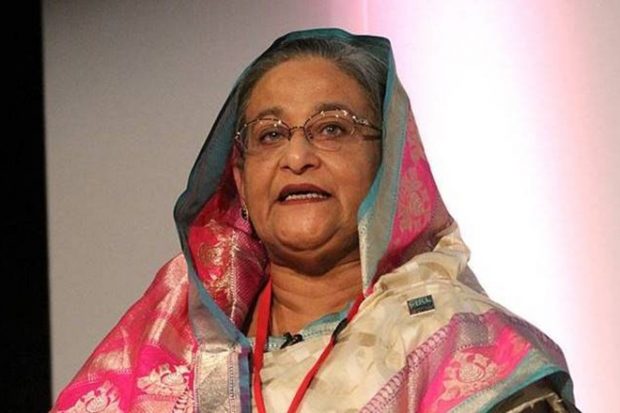Bangladesh: Remembering the August bloodbath
On August 21st in 2004, Sheikh Hasina survived a brutal attack on the Awami League leadership

By Saleem Samad
As dusk fell on August 21, 2004, I received a desperate phone call from a diplomat (his identity cannot be disclosed). His voice was very urgent and he said his head of mission demanded to know whether Sheikh Hasina was safe.
Hasina was an opposition leader of the Awami League and was intermittently boycotting the parliament sessions to protest against the stubbornness of the ruling alliance of Bangladesh Nationalist Party (BNP) and Islamist party Jamaat-e-Islami in refusing the opposition adequate participation in the parliamentary debate.
Why, what’s the news of Sheikh Hasina, I asked the diplomat? He disclosed that several hand bombs were lobbed at the rally, dozens of senior AL leaders were wounded, and many more were dead and nearly 200 rally participants were grievously injured at Bangabandhu Avenue. Please call back to confirm her status, whether she is injured and where she is now.
The call came 20 minutes after the brutal attack, which is believed to have had an objective to eliminate Sheikh Hasina, neutralize the Awami League party by killing senior leaders, and thus, the opposition would be paralyzed.
It was an evil dream of Hawa Bhaban, the de facto power out of Prime Minister’s Office. He manned a separate office in the posh Banani area by Prime Minister Khaleda Zia’s eldest son — an obtrusive politician Tarique Rahman (a fugitive in exile in London); I could not digest the breaking news.
I began to call the press photographers, including Pavel Rahman of Associated Press, Rafiqur Rahman of Reuters, Shambunath Nandi of Bangladesh Observer, and few others. Unfortunately, none of them responded to my phone calls.
Out of the blue, my colleague in the Bangladesh Observer, Khandaker Mohitul Islam Ranju, called me. He was listening to the rally near Dhaka Stadium, a stone’s throw distance from the scene of the occurrence, and a stark witness of the carnage.
Quickly, I asked him about Hasina, whether he has had any knowledge of her status. He said he couldn’t confirm her status.
Still not getting information about Hasina, I called a field officer of National Security Intelligence (NSI). After several anxious calls on his mobile phone, finally he responded in a stress-free mood as if nothing had happened.
I asked whether he had any information about Hasina. Promptly he said that the rally had ended more than an hour ago and Hasina must have left the place.
My second quick question was, where was he? He replied that he was at a music store at Topkhana Road (not far from the venue) and was listening to Rabindra Sangeet with a headphone. The third question was, did you not listen from other field officers of what happened at Bangabandhu Avenue over walkie-talkie? He said his walkie-talkie was switched off.
I repeated what I heard from the diplomat and my journalist friend. He laughed at the information I shared with him. I earnestly requested him to switch on his walkie-talkie.
Once he switched on the two-way radio, I could hear clattering noises from his radio. Before I could request him to call back on any news of Hasina, he hung up and did not respond to my calls throughout the night.
Three hours after the incident, still no news of the fate of Hasina. Ranju called back and confirmed that Hasina’s private security had dashed her to Dhanmondi. I asked him which hospital in Dhanmondi. He said no, she has reached her Shuda Shadan residence. The following day, while walking to the place of occurrence from Press Club, I met the NSI officer (his name has been suppressed for security reasons) walking towards the Secretariat Building.
While walking and talking, I asked him why he had abandoned his position in the rally and was listening to music. He replied that his superior officer had asked all the Field Officers to leave the venue after Hasina arrived at Bangabandhu Avenue. So, he moved away, ad as nothing else was expected otherwise, he switched off the radio.
By the way, who was his superior? He did not hesitate to indicate that it was none other than the director-general of NSI, Major General Rezaqul Haider Chowdhury (a notorious officer presently languishing in prison pending appeal verdict of the infamous 10-truck arms haul in Chittagong).
To my surprise, he voluntarily gave me additional information that the NSI chief was at Holy Family Hospital at Eskaton instead of Combined Military Hospital on the fateful evening. “Now you understand who is responsible for the incident,” the NSI officer said and walked away, requesting me not to quote him ever.
Describing the incident, lawmaker Saber Hossain Chowdhury and former junior minister in previous Awami League cabinet said the driver of the vehicle intelligently outwitted the assassins and bombers and saved Hasina from the attack.
The customized bullet-proof vehicle Range Rover, a gift of Chowdhury, was shot several times. The snipers continued to target the grieving Hasina seated on the front passenger side to accomplish their killing mission. The windshield, window, and door bore marks of bullets.
The assassin team had deployed sharp-shooters in strategic points on rooftops. On an ominous day, armed police were deliberately not positioned on the rooftops on duty.
As soon as the vehicle managed to manoeuvre out of the massacre site, the nervous Special Branch officer onboard the escape vehicle sought clearance over his walkie-talkie for a secured route. An unnamed officer in the control room barked at him to wait for the police escort vehicle, but the driver refused to listen.
The vehicle zigzagged through the Dhaka University campus and reached home safely in 15 minutes and, thus, Sheikh Hasina cheated death.
(The author is an independent journalist, media rights defender, and recipient of Ashoka Fellowship and Hellman-Hammett Award. Twitter @saleemsamad.)